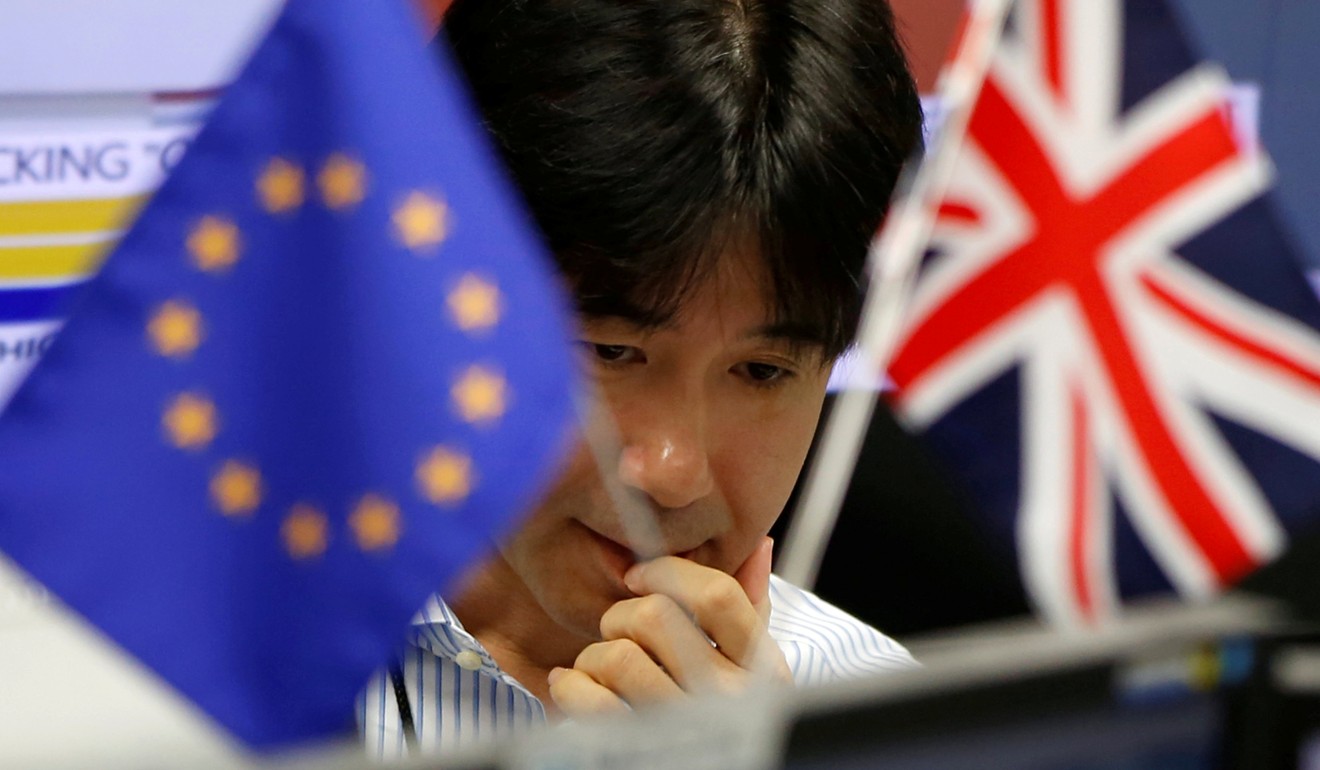
Volatility, uncertainty: what Asia has to fear from Brexit turmoil
- Theresa May’s postponement of a vote on the UK’s departure from the EU has hit the pound and Asian markets
- Analysts fear a new era has dawned in Asia’s trade with the West – one dominated by geopolitical chaos
Chaos reigned after May’s decision on Monday: the pound fell sharply, Asian markets plummeted and Britain’s political future was thrown in doubt.
For Asia, analysts said the UK’s continuing turmoil pointed to something else: a new era of trade with the West in which “volatility and uncertainty are the new norm”, in the words of one firm, and a time when geopolitical chaos could increasingly damage economic growth from India to Japan.
And Ross Denton, a partner at Baker MacKenzie, the world’s second-largest international law firm, said that the stable business environment in which Asian businesses could build supply chains with the West was now under threat.
Brexit Britain is missing an Asia policy
“The poles we have used to guide us,” he added, “have all been obscured”.
Raj Bhala, a professor at the University of Kansas Law School and a lifetime member of the Indian Society of International Law, went further.
He argued that Brexit was an urgent matter for Asian economies because of the deadlines associated with the withdrawal, such as March 29, when the UK is scheduled to depart the EU. The deadline for Parliament to agree a deal is January 21, at which time Britain must declare what it intends to do.
“It’s a big deal in Asia if a country is serious about ensuring that its producers and exporters of goods and services enjoy at least as good terms of entry, and at least as level a playing field, to the UK and EU after Brexit as they had before Brexit,” Bhala said.
He added that the average Asian consumer stood to be affected as well: “If they work for or run a producer-exporter, then maybe that Asian company will have enhanced market access to the UK and EU markets – or it won’t.”
Bhala puts the world’s current economic turmoil – the triple-whammy of Brexit, Trump’s tariffs and the US-China trade war – in historic terms:
“Volatility of this order – the breadth and depth of chaos in international trade law, policy, and patterns – is unusual since the second world war and perhaps since the 1973 Arab Oil Embargo.”
BREAKING SUPPLY CHAINS
Ros Kellaway, a partner at Eversheds Sutherland, has written that the painful, stop-start process in the British Parliament had created “uncertainty for businesses, their employees and economies” around the world.
“I would say that for Asia the key things are that if people have invested in the UK, they need to understand how their business will be impacted by Brexit. Every Hong Kong investor in Britain, for example, will want to know about their supply chains and the effect on goods and services,” Kellaway said.
She continued, “Then we’ve got to think about tariffs. Asia will want to know about the free trade agreements, with South Korea, for example. What will the tariff rates be? These agreements will need to be worked out by March.”
For Asian companies, the UK has long been used as a port of entry, or “jumping off point”, to access the European market – that practice may now be in jeopardy.
An estimated 800 Indian companies operate in Britain, according to Grant Thornton, the global accounting firm, and India reportedly invests more in the UK than all the rest of the EU.
But Bhala, the legal scholar, has written that India should “take advantage of the present uncertainty about the future relationship between the United Kingdom and European Union to rethink Indian trade relations with the former colonial master and the entire continent”.
Hong Kong handover took almost 20 years. Brexit’s taking two. A UK self-esteem issue?
He said Indian companies would not leave the UK, but neither would they expand there. “If their goal is to get into the EU, they will start seeing the EU as it’s own port of entry into the EU.”
Japan is another example: The Guardian newspaper wrote this week that “companies such as Nissan and Hitachi have invested more than £40 billion (US$50 billion) in the UK since the 1980s. More than 1,000 Japanese firms together employ about 140,000 people in Britain in manufacturing, pharmaceuticals and financial services.”
Even so, Nissan said last week said that there would be “serious implications” for British manufacturing if it left the EU without a deal. Toyota has made similar remarks about a no-deal Brexit.
WAIT AND SEE
“In the past, if you were an Asian business who wanted to come to the EU, you would have started in the UK because of the stability of government, the language and the court system. We saw that with one Japanese company after the next, and more recently with Chinese businesses,” said Denton, of Baker MacKenzie. “As a result of Brexit, and also Trump, you’re starting to see a decline in the number of Asian companies investing in the UK.”

Not all Asian nations are so concerned. A partner at a global law firm said many Southeast Asian economies had a little exposure to whatever Brexit outcome was decided.
“Most Southeast Asian companies will wait-and-see and exercise caution. The first thing our clients are asking is, ‘Do they have major exposure in the UK’,” said the trade law expert.
“We’re advising caution, and we don’t believe the issue will be resolved in the short term.”
Cameron, of the EU-Asia Centre, said the delay was unlikely to be the end of the economic woes surrounding Brexit.
“It is difficult to say what’s next, given that we do not know what the deal will be,” he said. “Obviously a no-deal would be catastrophic for the UK and have a knock-on effect on the world.”

